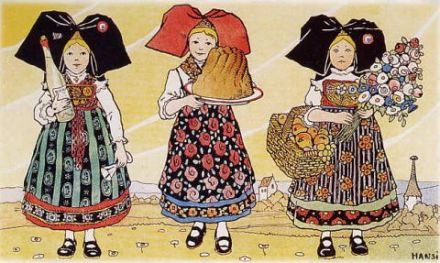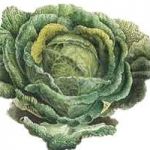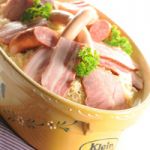 |
Flavors of France > A culinary journey
Alsatian controversy over sauerkraut
These days, sauerkraut is the Alsatian dish par excellence and is particularly authentic and festive when accompanied with cooked pork products (choucroute garnie). The metamorphosis of cabbage into sauerkraut goes back to the Alsatians who discovered how to make "choucroute," from the German for "sour vegetable."
They first took the best Alsatian cabbage, quintal, and cut it into thin strips; after that it becomes a sensitive question of flavours and colours. The surrounding controversy takes on almost political dimensions and has enlivened many an evening discussion. Choucroute is traditionally eaten for Sunday family meals and is always part of the menu for weddings. As winter approaches, you'll see people throughout Alsace thinly slicing the famous local quintal with a coupe-choux, a plane designed especially for the job.
Goose Liver
Alsatian foie gras, the liver of force-fed geese, was invented by Jean-Pierre Clause, chef to Marshal Contades, the military governor of Strasbourg from 1762 until 1788. Since the Roman legions arrived in Alsace and began using geese to guard farms, no one has been able to resist foie gras, so meltingly soft and tender that a single bite has been know to make a grown man cry.


Cabbage for saerkraut
Asparagus
Berries
Cheeses
Tomme d'Alsace, bargkass
Munster or munster géromé
Beer
Alsatian wines: riesling, gewurztraminer, sylvaner


Spätzle
Even today, noodle-making brings back happy childhood memories to many Alsatians: the recollection of their mothers and grandmothers preparing the traditional recipe with fresh eggs and good flour, rolling out the dough with a rolling pin on a board kept in the sideboard just for that purpose, then laying out on quilts the thin, almost transparent, strips of dough…
Pastry
Sweetened with honey, Alsatian gingerbread has been made in local convents since the 15th century, particularly around the feast of St. Nicholas. Kougelhopf, meaning "raised ball," is a kind of buttery yeast-raised bread studded with raisins and candied fruit.
Flammeküeche
Also known as tarte flambée, it consists of bread dough, cream, onions and bacon. It is a traditional lunch dish in the Kochersberg area.
Pork charcuterie
In Alsace until the 19th century, pork was the most frequently eaten meat! Why? Because, as they say here, "every part of a pig is tasty!"
Pretzel
A small crisp biscuit glazed and salted on the outside in the form of crossed arms (from Latin "bracellus," arm).
Baeckeoffe
Alsatian hotpot of pork, mutton and beef mixed with potatoes and onions. This dish was traditionally served on laundry days.

-

 Recipes
Recipes
-

 Products
Products
-

 Entertaining
Entertaining
-

 Chefs
Chefs
-

 Hints & Tips
Hints & Tips
-

 Glossaries
Glossaries








